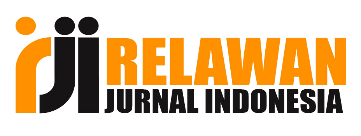Meningkatkan Prestasi Belajar Matematika Melalui Model Student Teams Achievement Division (STAD) Materi Operasi Hitung Yang Melibatkan Berbagai Bentuk Pecahan
DOI:
https://doi.org/10.32672/jkk.v4i3.155Abstract
Tujuan dari penelitian ini adalah: (a) Ingin mengetahui bagaimana peningkatan prestasi belajar siswa setelah diterapkannya metode pembelajaran kooperatif model STAD. (b) Ingin mengetahui bagaimana pengaruh motivasi belajar siswa setelah diterapkan metode pembelajaran kooperatif model STAD. Penelitian ini menggunakan penelitian tindakan (action research) sebanyak tiga putaran. Setiap putaran terdiri dari empat tahap yaitu: rancangan, kegiatan dan pengamatan, refleksi, dan refisi. Sasaran penelitian ini adalah siswa kelas VI semester II SD Negeri Trieng Meuduro Kec. Sawang Data yang diperoleh berupa hasil tes formatif, lembar observasi kegiatan belajar mengajar. Dari hasil analis didapatkan bahwa prestasi belajar siswa mengalami peningkatan dari siklus I sampai siklus III yaitu, siklus I (65,22%), siklus II (78,26%), siklus III (86,96%). Simpulan dari penelitian ini adalah metode pembelajaran kooperatif model STAD dapat berpengaruh positif terhadap motivasi belajar Siswa VI semester II SD Negeri Trieng Meuduro Kec. Sawang Kabupaten Aceh Selatan tahun 2020/2021, serta model pembelajaran ini dapat digunakan sebagai salah satu alternatif pembelajaran matematika.
References
Jamilatun, Umi & Rita P. Khotimah. (2016). Eksperimen Pembelajaran Matematika dengan Model Pembelajaran Kooperatif Tipe Student Teams Achievement Division (STAD) ditinjau dari Kemampuan Komunikasi Matematis Siswa Kelas IX SMP Muhammadiyah 1 Kartasura 2015/2016. Skripsi thesis, Universitas Muhammadiyah Surakarta.
Abimanyu, W. A., Bakri M., & Ibnu H. (2015). Penerapan Model Kooperatif Tipe STAD untuk Meningkatkan Hasil Belajar Siswa Pada Materi Luas Permukaan dan Volume Limas Di Kelas VIII SMP Negeri 5 Palu. Jurnal Pendidikan Matematika 4(2). Diakses Pada 10 Juni 2017, dari http://jurnal.untad.ac.id/jurnal/index.php/AKSIOMA/article/download/7753/6 108
Hamalik, Oemar. (2012). Kurikulum dan Pembelajaran. Jakarta: Bumi Aksara.
Hamruni. (2012). Strategi Pembelajaran. Yogyakarta: Insan Madani.
Hosnan, M. (2014). Pendekatan Saintifik dan Kontekstual dalam Pembelajran Abad 21. Bogor: Ghalia Indonesia.
Jamaris, Martini. (2014). Kesulitan Belajar Perspektif. Asesmen dan Penanggulangannya Bagi Anak Usia Dini dan Usia Sekolah. Bogor: Ghalia Indonesia.
Kemdikbud. (2011). TIMSS (Trends In International Mathematic and Science Study). (online: http://litbang.kemdikbud.go.id/index.php/timss, diakses tanggal 19 Februari 2022)
……..2015. "PISA (programme for international student assesment )". (online: http://litbang.kemdikbud.go.id/index.php/pisa, diakses tanggal 19 Februari 2022)
Khan, Gul Nazir. (2011). Effect Of Student's Team Achievement Division (STAD) of Academic Achievement Of Students. Acian Social Science 7(12). Diakses pada tanggal 27 Februari 2022. Dari https://www.ied.edu.hk/apfslt/downloades/v12_issue2_files/ibraheem.pdf
Downloads
Published
How to Cite
Issue
Section
License

This work is licensed under a Creative Commons Attribution 4.0 International License.
Copyright and License Agreement
- The author(s) owns the copyright and other proprietary rights associated with the article.
- The author(s) has the right and is permitted to use the substance of the article for the author's subsequent works, including for the purposes of lectures and books.
- The author(s) grants the first publication rights to the journal under a Creative Commons License (CC BY 4.0).
Creative Commons CC BY 4.0 License Statement
You are free to:
- Share — copy and redistribute the material in any medium or format;
- Adapt — remix, transform, and build upon the material
for any purpose, even commercially.
The licensor cannot revoke these freedoms as long as you follow the license terms.
- Attribution — You must give appropriate credit, provide a link to the license, and indicate if changes were made. You may do so in any reasonable manner, but not in any way that suggests the licensor endorses you or your use.
- No additional restrictions — You may not apply legal terms or technological measures that legally restrict others from doing anything the license permits.











